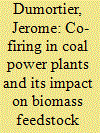|
|
|
Sort Order |
|
|
|
Items / Page
|
|
|
|
|
|
|
| Srl | Item |
| 1 |
ID:
124333


|
|
|
|
|
| Summary/Abstract |
Several states have a renewable portfolio standard (RPS) and allow for biomass co-firing to meet the RPS requirements. In addition, a federal renewable fuel standard (RFS) mandates an increase in cellulosic ethanol production over the next decade. This paper quantifies the effects on local biomass supply and demand of different co-firing policies imposed on 398 existing coal-fired power plants. Our model indicates which counties are most likely to be able to sustain cellulosic ethanol plants in addition to co-firing electric utilities. The simulation incorporates the county-level biomass market of corn stover, wheat straw, switchgrass, and forest residues as well as endogenous crop prices. Our scenarios indicate that there is sufficient feedstock availability in Southern Minnesota, Iowa, and Central Illinois. Significant supply shortages are observed in Eastern Ohio, Western Pennsylvania, and the tri-state area of Illinois, Indiana, and Kentucky which are characterized by a high density of coal-fired power plants with high energy output.
|
|
|
|
|
|
|
|
|
|
|
|
|
|
|
|
| 2 |
ID:
150737


|
|
|
|
|
| Summary/Abstract |
In the United States, road infrastructure funding is declining due to an increase in fuel efficiency and the non-adjustment of fuel taxes to inflation. Legislation to tax plug-in vehicles has been proposed or implemented in several states. Those propositions are contrary to policies to promote fuel efficient vehicles. This paper assesses (1) the magnitude of the decline in federal fuel tax revenue caused by plug-in vehicles and (2) quantifies the revenue that could be generated from a federal plug-in vehicle registration fee. We find that the contribution of plug-in vehicles to the decline of the federal fuel tax revenue is at most 1.6% and the majority of the shortfall can be attributed to the non-adjustment of the fuel tax rate and the increase in vehicle fuel efficiency by 2040. An additional tax of $50–$200 per plug-in vehicle per year in the reference case would generate $188–$745 million in 2040 which represents an increase of 1.69–6.71% in federal fuel tax revenue compared to no tax. The lesson for policy makers is that plug-in vehicles do not contribute significantly to the funding shortfall in the short- and medium-run and a supplemental tax would generate a small percentage of additional revenue.
|
|
|
|
|
|
|
|
|
|
|
|
|
|
|
|
| 3 |
ID:
175908


|
|
|
|
|
| Summary/Abstract |
Increasing biofuel production over the last decade and biofuel policies in Brazil, the European Union, and the United States have changed the global agricultural landscape in terms of land-use, commodity prices, and trade. Increasing fuel efficiency and electrification of the vehicle stock is projected to lower gasoline, diesel, and biofuel demand in the future. In this analysis, we quantify the effects of a 30% reduction in ethanol consumption in the U.S. and the European Union triggered by higher vehicle fleet fuel efficiency on global agricultural markets. Our results show decreases in global commodity prices by 1.9%–6.6% and a slight decrease in global cropland by 0.3%. Major changes occur in trade patterns with U.S. corn exports increasing by 30.3%. Global greenhouse gas emissions are lower due to the overall reduction in cropland. Gasoline and diesel consumption of the vehicle fleet is not changing rapidly but is a long-term process because vehicles are on average in operation for 10 or more years. Consequently, there are important long-term policy implications from changes in fuel efficiency requirements or ethanol blending limits that affect commodity prices, trade, and greenhouse gas emissions.
|
|
|
|
|
|
|
|
|
|
|
|
|
|
|
|
|
|
|
|
|